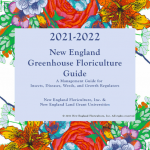Wooden stakes are a place where the bacterial pathogens that plague tomatoes can survive between crops. In fact, stakes from a tomato planting where research was conducted on bacterial diseases have been used as a source of the pathogen for subsequent experiments! Therefore, it is prudent for growers to disinfect stakes that were in a field where a bacterial disease occurred last year. This step is worthwhile even if there is uncertainty about occurrence considering how difficult bacterial diseases are to manage. There are three bacterial diseases of concern on tomato: speck, spot and canker. Bacterial canker is sufficiently destructive that discarding stakes is recommended after an outbreak. Before the field season is in full swing often presents an opportunity to find time for disinfecting stakes.
Step one in disinfecting anything is removing as much dirt and debris as possible because this can protect pathogens and de-activate disinfectant. Therefore start by hosing down used tomato stakes.
Clorox or other household chlorine bleach (5.25% sodium hypochlorite) is commonly used as an agricultural disinfectant, although quarternary ammonium chloride, detailed below, is a better choice. Use bleach at a rate of 0.5% (=1 part bleach + 9 parts water). And use in a well-ventilated area. Soak stakes for 30 minutes.
While bleach is highly effective, it is short-lived after mixing in water, with a half-life of only 2 hours, and it is especially prone to being inactivated by organic matter, thus pre-cleaning is critical. A disinfectant containing quarternary ammonium chloride salts like Green-Shield is more stable than bleach after diluting with water. Use at 1 tablespoon (=0.5 fl oz) of Green-Shield in 1 gallon water. While this disinfecting solution will be more stable than bleach, it should not be used more than 24 hours after preparation.
Organic growers typically use a disinfecting solution with hydrogen dioxide or peroxide as the active ingredient, such as an OxiDate or SaniDate mixture. Check the labeled rate on the formulation you choose, as initial strengths will vary.
Regardless of the sanitizer, you need to soak stakes for at least 10 minutes to allow sanitizer to penetrate into the porous wood surface.
-CDB, edits by CLS
Originally published by Cornell Cooperative Extension Weekly Vegetable Update, April 4, 2013.
 Pundt wrote three trade journal articles, three Crop Talk Newsletter articles, twenty-two factsheets, and was editor of the 2021-2022 New England Greenhouse Floriculture Guide
Pundt wrote three trade journal articles, three Crop Talk Newsletter articles, twenty-two factsheets, and was editor of the 2021-2022 New England Greenhouse Floriculture Guide